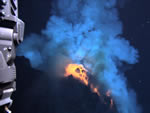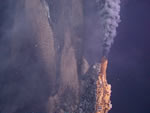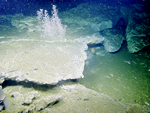EOI Research
Submarine Volcanism -
Time-Series Studies
Submarine volcanism takes place in diverse tectonic settings in the worlds oceans and provides the heat source for most hydrothermal vents. EOI uses ships, submersibles, and monitoring instruments to to discover and understand the geologic setting of seafloor hot springs.
Time-series studies:
Hydrothermal Vents -
Global Exploration
Hydrothermal venting occurs when seawater circulates deep into the ocean crust, becomes heated, reacts with the surrounding rock, and jets back into the ocean at seafloor hot springs. EOI studies the chemistry of hydrothermal fluids, gases, and mineral particles, and the plumes they form above the seafloor.
Exploration sites:
Continental Margin -
Methane Seeps
An unknown amount of methane is fluxing through continental margins, and up to ~5000 gigatons of carbon are stored in icy methane hydrate deposits within their sediment. Sources of this methane include biogenic production, disassociation of the methane hydrate layers, and deep thermogenic sources. Methane is one of a group of carbon species that have been recognized as important greenhouse gases and thus the methane geochemical cycle is important to climate modeling.
Visit the Cascadia Margin site



